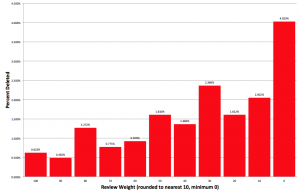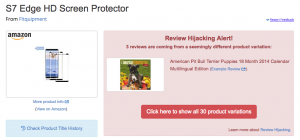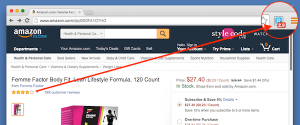Making legal threats or harassing the owners of ReviewMeta.com
ReviewMeta occasionally receives legal threats from businesses who want their pages to be removed. This page will help clarify questions you have about ReviewMeta and ultimately save you on unnecessary legal expenses by engaging in a futile lawsuit.
The information on this page is not a binding legal contract – however it’s important to re-review the legally binding Terms of Service you agreed to by browsing our site.
About ReviewMeta
ReviewMeta is a free online tool that analyzes reviews on third party websites. Our analysis is merely an estimate and is very clearly labeled as such. We have taken every reasonable measure to ensure viewers understand that the report is an estimate and not a statement of fact.
Keep in mind the following:
- ReviewMeta does NOT write reviews on products.
- ReviewMeta does NOT make any assessments regarding actual products, only the reviews.
- ReviewMeta is an estimate.
- ReviewMeta does NOT claim any product has “fake” reviews.
Why might a report change?
Reports are a snapshot taken at a certain point in time. When a report is a week old (sometimes even less), any future viewer of that report will have the option to refresh the report and re-analyze the reviews. Even if no new reviews are added or removed, it is possible that the result of that analysis may change.
This could be due to:
- changes in the profile of the reviewers. Reviewer information (e.g. which products they have reviewed, total number of reviews and average rating) is considered in every report. Even if the information for every reviewer has not changed at all, the ReviewMeta servers may have collected more information to create a more complete picture.
- aggregate category data may have changed. ReviewMeta often compares product data with average data from the category to give us an idea if the trends are outside of what we’d expect. So essentially, the baselines can change.
We do NOT manually make changes to individual product reports. Every single report is generated using the exact same set of rules, and there are never exceptions made for specific products.
Page or Brand Removal
Our policy is to never remove products, brands or pages from ReviewMeta.com – ever. What good would our tool be if we simply removed any page at the request of the brand?
Your best option: post a Brand Response
We understand that brands should be able to publicly respond to their reports, and that’s why we have created the Brand Response feature. You are free to say whatever you want – disclose your review collection process, engage in a healthy debate about the in’s and out’s of the algorithm, or maybe just show your true colors and post an incoherent string of personal attacks.
DO NOT send harassing messages to us – they may be published.
ReviewMeta has been the target of harassment from a handful of sellers who do not agree with our analysis. We have updated our policy to publish these messages when received to help stay transparent and inform the public when specific individuals are trying to silence our right to free speech.
Legal threats will not work.
For anyone thinking about sending in a legal threat, we will save you time and money by outright telling you that your threat will not work on us. We’ve seen it all: claims of trademark infringement, defamation and even tortious interference.
Many attorneys will advise to their clients to send us an initial demand letter for a few reasons:
- The attorney thinks that:
- We are ignorant of the law.
- We don’t fully understand the protections granted under the first amendment.
- We will be frightened by the big words and scary threats from their official-sounding letter.
- The attorney does not fully understand the law
We can assure you that we have spent a lot of time and resources making sure that the content on ReviewMeta is not defamatory or infringing on anyone’s trademark or copyright. Here’s why these claims will NOT work:
False Claim #1: Trademark Infringement
The claim of Trademark Infringement is the most common complaint we receive and understandably an easy go-to for attorneys looking for a quick scare. This is because you’ve spent the time and money to register your official trademark, you own the term, and you can point to our page and say “we own this term, you’re not allowed to use it”.
However, there’s something called “Fair Use”. Just because you own a trademark does NOT mean that NOBODY is allowed to ever mention it. When ReviewMeta uses your trademark, we are simply referencing the mark to identify which product’s reviews we are analyzing. How else are we going to identify your product or brand without using the name and/or image?
Furthermore, we very clearly state that we are NOT associated with any product or brand so there should be no confusion on the part of the consumers. Also, we don’t sell anything ourselves, so we aren’t in competition with any trademark listed on our site.
Interestingly enough, out of the dozens of “Trademark Infringement” notices we have received from various lawyers over the years, ZERO have resulted in an actual lawsuit – likely because each attorney knows the limitations of the law but sends the letter hoping that we don’t.
You can read more about the Fair Use on Wikipedia: https://en.wikipedia.org/wiki/Fair_use_(U.S._trademark_law)
False Claim #2: Defamation
Just because something is said about you or your brand that you don’t like or that you disagree with, does not mean that it’s defamation.
Your big problem here is the protections granted under the First Amendment of the constitution. Our country was founded on the right to free speech. It’s an uphill battle to try and silence us.
In order to win a defamation suit, you have to prove we did ALL of the following (source):
- made a false and defamatory statement concerning the plaintiff;
- shared the statement with a third party (that is, somebody other than the person defamed by the statement);
- if the defamatory matter is of public concern, acted in a manner which amounted at least to negligence on the part of the defendant; and
- caused damages to the plaintiff.
Let’s go through each of these (remember that ALL must be proven. Every. Single. One.)
- False Statements
You will never prove this. Period. We present our ANALYSIS and clearly label it as an ESTIMATE. We are not making statements of fact. Statements of opinion are not actionable.
- Shared with third party
Our reports are publicly available to anyone with a computer and internet connection. We can’t argue with this one.
- Acted negligently regarding matter of public concern
Again, you will never prove this. Authenticity of reviews IS a matter of public concern, and it’s very clear we have not acted “negligently”. We go to great lengths to display all of our work behind our calculations, and even allow our visitors to adjust our calculations however they see fit.
- Damages
You’ll have to prove that the information in our reports DIRECTLY resulted in loss of sales. You can’t just show a downward sales trend. You’ll have to have customers, on the record, under penalty of perjury, affirming that they decided not to purchase your products because of the FACTUALLY INACCURATE information contained on OUR site. Good luck with that.
Filing a suit for damages is going to end up costing you time and money and will get you absolutely nowhere.
Per our Terms, we reserve the right to publicly share your threats and/or actions.
We believe that companies who make threats or file baseless lawsuits in an attempt to hide information from public view is an action that the public should be aware of. That is why we reserve the right to share with the public any threats or lawsuits filed against ReviewMeta or any of it’s owners. Not only are you wasting your time and money, but your actions are not done in private.






This is a giant and well-deserved middle-finger-on-a-stick to all those predatorty lawyers out there. I’m going to go looking for those legal threats right now!
Great product, BTW. I just used it this evening to buy an angle grinder.
Where do you share such legal threats?
Either the forum or in a blog post or both.